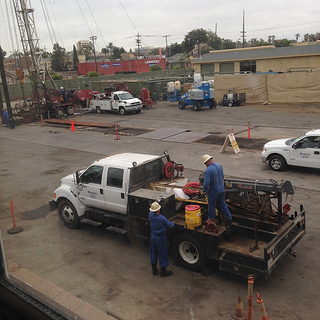Gas-Holes: Acidizing Continues To Threaten USC-Area Residents

Jacob Soboroff, host of Pivot TV’s “Take Part Live,” was in my apartment to investigate the drilling site next door. The active drilling within the enclosed compound below my window testified to the reality of what money and power could impose on families and students in this neighborhood. The acrid affront to our nostrils was further proof that the drilling operation off of Jefferson Blvd., just four blocks west of the University of Southern California campus, was real and foul.
“Take Part Live” is a new show aimed at millennials that covers a wide variety of social issues. When Soboroff and his film crew came into my second-story apartment to view the site from above, they were shocked at the strength of the odor that permeated all of the rooms.
“Unbelievable: that smells just like the La Brea Tar Pits,” Soboroff said.
After filming from the window, he wanted footage of the workers explaining what they were doing. We went downstairs, out of the apartment, and approached the industrial operation next door, obscured behind a cement wall and large metal gates used by equipment and wastewater removal trucks for entry and exit.
Soboroff shouted through an opening in the gate, asking to speak with anyone about the drilling. We were ignored. After persisting for several minutes one worker came to the opening, and said he could not talk, then dead-bolted the gate. We walked about 200 feet to another gate that was slightly ajar. The workers saw the crew with their cameras, instantly abandoned their drilling duties, ran to the gate and pulled it shut.
Soboroff continued asking for someone to speak with us. Nobody responded. We went from one locked gate to the next surrounding the site, requesting that someone, anyone, explain the purpose and process of such a scene in the middle of a residential neighborhood. Inside the compound, voices remained silent. The only comment came from the whoosh and whirr, clang and bang of the drilling rig.
Danger lurks 50 feet from the homes of families and students. According to Freeport McMoRan Oil and Gas Company, nearby residents have no right to know what is happening. Freeport McMoRan doesn’t want neighbors to know what it is doing because residents may feel threatened. If this drilling operation and others like it in and around Los Angeles were safe, there would be transparency, and Freeport McMoRan would not be so secretive about their activities.
At a public forum hosted by the USC Political Student Assembly in November, the president of the USC College Republicans, Jennifer Massey, debated community members who live near the drilling site in the University Park Neighborhood. For two hours Massey defended the stench, the noise, the glaring lights and acidizing of soil and water at the site. When she finished, I asked her one simple question: would she live next to one of the drilling sites? The question was avoided. Her two pro-fracking cohorts, a petroleum engineering doctoral candidate and another student from USC College Republicans, tried to avoid the same question, but finally answered “No.”
Proponents of this insidious drilling believe fracking and other hazardous oil extraction processes are a wonderful contribution to the economy and energy independence of the United States—as long as they don’t have to live near it, as long as they don’t have to drink the tainted water, or be subjected to the stink and environmental destruction.
Unfortunately, environmental destruction affects us all. We have a right to know what is occurring near our homes and in our communities. We have a right to know about activities that jeopardize our lives, whether nearby or far away. We have a right to know the facts, a right to discuss the consequences and a right to stop practices that are hazardous to our health. There is too strong a correlation between what is happening to the environment and what is happening to our human rights, and nothing strengthens the ruling corporations so much as silence. Together, we can protect ourselves, our children, our families and our friends.
Currently, fracking in California is unregulated. However, a vote to place a moratorium on fracking in Los Angeles will take place in the spring. Support from Los Angeles City Council members in the USC area will be important in that vote. You can support the LA Moratorium by contacting your city council member here.
Check out the “Take Part Live” coverage of the drilling site here.
Reach Contributor Alina Evans here. Read more from Evans on fracking here.



